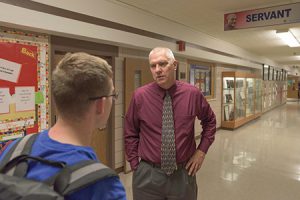
Mind Trust drawing big dollars from national donors
The reputation the education reform group has engendered with its work in the city has spread—and therefore so has its donor base.

The reputation the education reform group has engendered with its work in the city has spread—and therefore so has its donor base.

Over six years, the state has spent more than a half billion dollars on vouchers. During that time, Indiana’s program has expanded, giving more students access to vouchers than in any other state—despite mixed evidence from researchers that vouchers help students achieve.
Betsy DeVos shouted out School 15 in a speech Monday, calling it “an example of new thinking.”
Joining the IPS innovation network would give Herron access to additional funding, but it would retain most of its independence. Herron’s head of school said the move "will not impact students in any way."
The Mind Trust, an Indianapolis-based not-for-profit that promotes education reform, will use the funds to support Innovation Network Schools and recruit school leaders.
Kelli Marshall will permanently replace Marcus Robinson, who resigned earlier this year after questions about the financial state of the network and his lavish spending as CEO.
The group is seeking to raise $32 million to fund the first half of its plan, which aims to double the number of students within Indianapolis Public Schools boundaries who attend highly rated schools.
Ace Preparatory Academy, started by an aide to former Indiana schools superintendent Tony Bennett, is at about 22 percent of its initial expected enrollment, with just 33 students as of Oct. 19.
The Indianapolis charter network was the only Indiana charter network to win one of the grants.

Public schools—including traditional, district-run schools and charters—are employing ever-more sophisticated advertising and marketing campaigns in an effort to meet enrollment targets by the time the official state count day rolls around.

The Republicans and Democrats running for governor and state superintendent say they’ll focus their energy on kids, although they have different plans to do so.
Indianapolis’ cash-strapped homegrown charter school network Tindley Accelerated Schools is getting a boost from one of the city’s most ardent school choice supporters.

If the 60 students in Don Wettrick’s innovations class at Noblesville High School aren’t willing to fail, they won’t succeed in his class.
A New Hampshire pilot program eschews computerized testing and multiple-choice tests for “performance tasks” spread throughout the school year that are meant to measure a deeper understanding of the subjects students are studying.
Just a week after the Indianapolis Public Schools board heard a proposal to create a school for students who are new to the country, the plan won approval Thursday night. The board also OK’d plans to convert two district schools to “innovation” status.
Five years after taking over management of three failing Indianapolis schools, Charter Schools USA has rolled out an unusual proposal for revamping Howe High School. But the plan could face resistance.

The problems at Tindley Accelerated Schools didn’t go away when Chancellor Marcus Robinson resigned. If anything, the change served only to highlight the challenges still facing the once-lauded charter school system.
Supporters say the bill would help students who have been expelled or dropped out of school get back on track, while critics contend it’s too broad.

The measures were given final approval by the full House and Senate on Thursday, checking off a major priority for Gov. Mike Pence and fellow Republicans in the Legislature.
Pinnacle Partners Inc. has sued the charter school operator for allegedly failing to pay its $15,000 finder’s fee for placing a staff accountant. Tindley recently missed ambitious enrollment targets, creating a cash crunch.